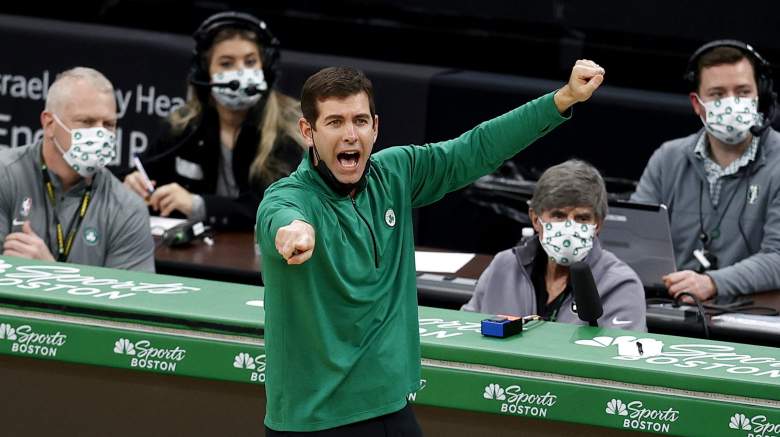
Getty Celtics head coach Brad Stevens
Entering Tuesday’s game against the league-leading Utah Jazz, the Boston Celtics had good reason to believe they could win.
Unlike the first time the teams met, a 108-122 Jazz win in early February, Boston was now almost entirely back to full-strength. Hustle-leader Marcus Smart would be playing his third straight game since missing the previous 18 with a calf strain, and Kemba Walker’s troublesome left knee, which forced him to start the season 11 games late, was finally healed. The Celtics were also coming off a trouncing of the Houston Rockets on Sunday, a game in which their talented young big man, Robert “Time Lord” Williams, continued his stellar play despite limited minutes.
But executing is everything in the NBA and the Jazz, as they’ve done all season, made more plays when it mattered most — scoring a 117-109 road victory off the strength of a 40-point fourth quarter. The loss dropped Boston to sixth in the East and only one game above .500.
ALL the latest Celtics news straight to your inbox! Join the Heavy on Celtics newsletter here!
Afterward, Celtics head coach Brad Stevens spent most of his postgame interview lauding the Jazz, especially their ability to make other teams pay for mistakes and their superior decision-making.
Quick Decision-Making and Spacing
According to Stevens, the Jazz were highly effective at making the Celtics pay for split-second decisions on defense, particularly when it came to screens.
“You’re going to have moments where they make tough shots,” explained Stevens. “But we had too many moments where we hit screens at the top of the key [and] they made us pay. Or we end up going under a screen when we need to chase and challenge. We end up not getting high enough on their hip and chasing and making it as difficult as possible. And we did so on a few occasions really well late. But your margin against them is, if you don’t do that they make [the shot].”
To be clear, the Celtics didn’t play poorly. At one point early on they had an 11-point lead, and the final team stats were heavily in Boston’s favor — from field goal percentage and rebounds, to assists, steals and turnovers. Though Smart shot poorly for the first time since his return (2-for-10), his 25 minutes were a good sign that he’s close to resuming a regular workload. And Time Lord continued his excellent play, pulling down nine rebounds, blocking two shots, and contributing 14 points on 7-for-10 shooting.
But the Jazz finished with a decisive edge in made three-pointers, 19-10 — perhaps the most crucial stat of all — and Stevens felt the biggest difference there came from Utah getting more quality looks.
“If you would’ve told me we took 18 more shots in the game, I would’ve felt pretty good about our chances,” said Stevens. “But I do think the quality of shots, as far as just from an efficiency standpoint, favored them quite a bit, as it has all year. They’ve been the best in the league at it.”
The Jazz, according to Stevens, were able to get those quality looks primarily as a consequence of quick decision-making and excellent spacing, with his reverence bordering on jealousy.
“That’s what you hope to get to,” said Stevens about Utah’s decision-making. “You hope to get to the point where you catch it, you’re open you shoot it, you come off a screen you’re open you shoot it, or you come off a screen and they’re up, you get rid of it quick and you make the right read — whether it’s ahead, whether it’s to the roll, whether it’s to the guy behind, whether it’s across the court on a skip. Those are things that the best pick-and-roll players, the best catch-and-shoot players can do as they continue to progress. They’ve got a number of excellent decision-makers with the ball. Obviously, (Donovan) Mitchell and (Mike) Conley are two of the best pick-and-roll players in the league, but (Joe) Ingles is one of the best pick-and-roll shooters and passers in the league and has been for years. And so they just have a lot of guys that make that quick reads. And then they’re spaced so well.”
The Gobert Report
As in their first matchup, the Celtics had trouble game-planning against Utah’s athletic and super-long center, Rudy Gobert. Although the 7-foot-4 shot-blocking machine is primarily renown for his defense, Gobert’s ability to wreak havoc on the offensive end is far from lost on Stevens.
“There’s not a guy out there that’s not skilled,” said Stevens about the Jazz. “Very good passers, very good making decisions. And then when you have Gobert rolling to the rim, you’re in a bad way. [The] rolls pull you in and then you’re scrambling and if you get scrambling against them they’re gonna get great looks. Thought we had some really good defensive possessions, just not enough of them. That’s a combination of tremendous coaching, tremendous skilled players, tremendous quick decision making and a 7-foot-4 guy rolling to the front of the rim every time.”
Intangibles aside, Gobert impact was obvious from the box score, as well: 16 points on 5-for-6 shooting, with 12 rebounds and four blocked shots.
READ NEXT: Top Celtics Trade Target Off the Table: Reports